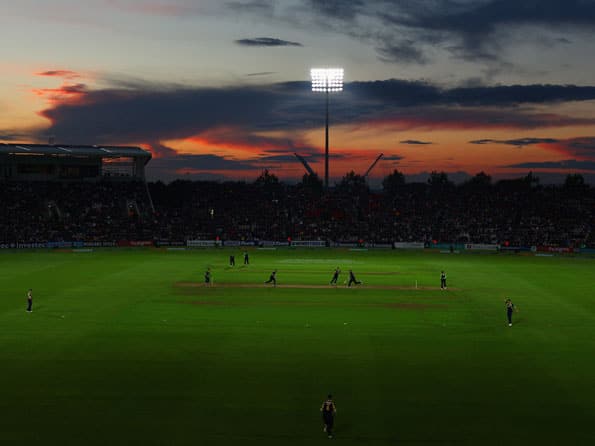
Cricket Country Staff
Editorial team of CricketCountry.
By Julian Guyer
When the Rose Bowl becomes a Test venue by staging the England-Sri Lanka series finale on Thursday it will be 25 years since Mark Nicholas helped conceive the idea of the ground.
Written by Cricket Country Staff
Published: Jun 16, 2011, 11:07 AM (IST)
Edited: Jun 16, 2011, 11:07 AM (IST)


Mark Nicholas opines that the Rose Bowl is undeniably scenic © Getty Images
By Julian Guyer
Southampton, England: Jun 16, 2011
When the Rose Bowl becomes a Test venue by staging the England-Sri Lanka series finale on Thursday it will be 25 years since Mark Nicholas helped conceive the idea of the ground.
In that time the former Hampshire captain’s dream also became something of a nightmare and, but for the intervention of millionaire Rod Bransgrove, the southern county may well have gone out of business.
Set in the Hampshire countryside and, in Nicholas’s words, “probably more breathtaking than I thought (it could be),” the Rose Bowl — which only made its first-class debut in 2001 — is undeniably scenic.
And a venue which can, with temporary seating, boast a 20,000 capacity, is very different from Northlands Road, Hampshire’s compact headquarters ground for more than a century in the nearby city of Southampton.
It was in 1987, while Hampshire captain, that Nicholas came to the conclusion it was time to move.
“Northlands Road was close to dysfunctional,” he told AFP.
“On a big match day, when cars were parking in the net area, there wasn’t even anywhere for the players to have a hit so you had to go on the outfield. Charming as it was in its way, it had nothing at all to do with the 21st Century. It was definitely time to do something else and it couldn’t really be done on that site because of a lack of space. Given the value of that site, certainly in 1987 when we conceived the idea (of moving), there seemed to be no problem in selling it for residential development,” added Nicholas, who is now a television broadcaster.
Bill Hughes, the then Hampshire vice-chairman and a surveyor by profession, discovered the Rose Bowl site, a field where cattle could once graze, and talks began with its owners, Queen’s College, Oxford.
But a combination of a UK recession in the late 1980s and Hampshire’s own inertia meant that, when they were ready to move, they faced a 10 million pounds shortfall having already signed over Northlands Road to the developers.
“I always thought I’d play on it (the Rose Bowl) but I retired in 1995 and then had a two or three-year period when I wasn’t that involved,” said Nicholas.
“Then, an amazing thing happened. Rod Bransgrove, who I knew as a friend because he was a mad keen supporter and he’d actually become a very close friend of Paul Terry and Chris and Robin Smith (all Hampshire team-mates of Nicholas), got onto the Hampshire committee.
“One day I got a call. It was Rod and he said ‘they want me to become chairman’. I said ‘it’s not for you’. And he said ‘what if I bailed out the new ground? I could provide enough money to secure the future’.”
Securing that future has cost Bransgrove, who made his fortune in the pharmaceutical industry, more than six million pounds and counting since he became chairman in 2000.
Bransgrove’s bail-out ripped up Hampshire’s committee structure — an entrenched feature elsewhere in English cricket.
It led to accusations he was just a wealthy ‘hanger-on’ who liked being around top sportsmen such as Shane Warne, later Hampshire’s captain.
However, Nicholas insisted: “Rod was pouring money into a black hole but he genuinely loved it and of all the things I have heard that have upset me over the past four or five years, it is when people have said he was only in it for himself, he only wanted kudos and ego, he didn’t truly care about the game.”
© AFP
This website uses cookies so that we can provide you with the best user experience possible. Cookie information is stored in your browser and performs functions such as recognising you when you return to our website and helping our team to understand which sections of the website you find most interesting and useful.
Strictly Necessary Cookie should be enabled at all times so that we can save your preferences for cookie settings.
If you disable this cookie, we will not be able to save your preferences. This means that every time you visit this website you will need to enable or disable cookies again.
